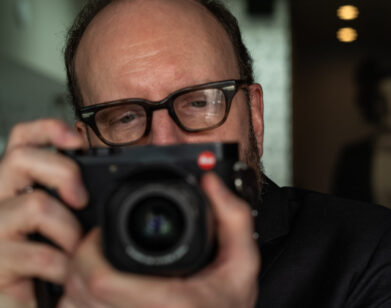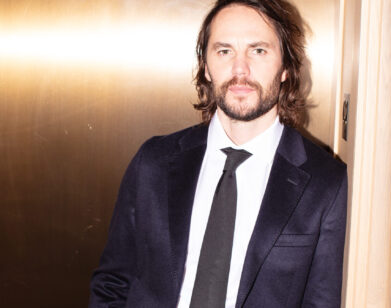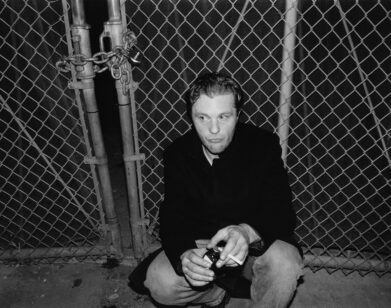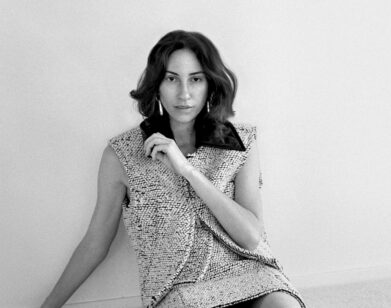Rhys Plays Nice
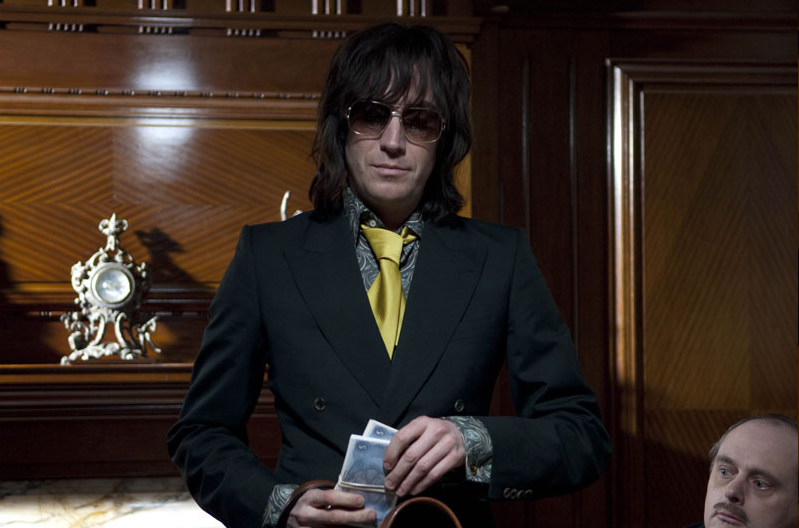
RHYS IFANS IN MR. NICE. PHOTO COURTESY OF SUSIE ALLNUTT
In his new film, Mr. Nice, Rhys Ifans brings the same charm to the real-life legendary Welsh drug smuggler, Howard Marks, with which he infused the scruffy slacker, Spike, in Notting Hill. Ifans has a knack for disappearing seamlessly into roles that quietly end up becoming all-time highest-grossing British films (Notting Hill) or Oscar nominees (Exit Through the Gift Shop). In Mr. Nice, Ifans is joined by Chloë Sevigny and Crispin Glover in a three-continent romp, stretching from smoke-filled Oxford dorm rooms and the hashish fields of Kabul, Afghanistan to IRA-terrorist-filled pubs and federal prison. Ifans took some time to discuss his capers with Interview.
LORRAINE CWELICH: What attracted you to playing Howard Marks?
RHYS IFANS: We’re both Welshmen and growing up, when Howard was finally caught, it was all over the news. He did an interview in the Welsh language, which I also speak, and I was sort of just amazed that this man from a small country was for many years supplying much of the world with most of the marijuana it was smoking. It was incredible. When he came out of prison, years later, I met him at a concert in South Wales; I was a young whippersnapper and Howard was kind of an outlaw hero. I said to him—and it’s on tape, a cousin of his filmed our meeting—I said, “If you write a book, I want to play you in a movie.” He said, “Let’s shake on it,” and we did. Thirteen years later, there we were, making the movie.
CWELICH: What is about him that you found heroic?
IFANS: It was a hero’s journey. He evaded the authorities for many years, he didn’t kill anyone, he wasn’t a violent man. He’s very intelligent and well read, eloquent, witty, charming. I think it was those qualities that got him through. I was interested to explore that because generally, we perceive criminals as dark, twisted, angry characters. Howard isn’t any of those. He was punished for his crime, released from prison, and has lived to tell the tale.
CWELICH: In the film, he is also clearly a devoted husband and family man.
IFANS: Absolutely. What I discovered in making the film was how painful it was for his family to be torn apart in such a brutal way. It was kind of devastating for them all.
CWELICH: How did you like working with Chloë, as your wife?
IFANS: We share the same manager, and I’ve sort of followed her career since she was in Kids, and she’s just so cool. I think that I’ve always wanted to work with her, so when I discovered that Bernard had cast her—as well as David Thewlis, another actor I really admire—I thought it was a fantastic cast.
CWELICH: How did you like working in a period piece, set mostly in the ‘70s?
IFANS: It’s not that far in the past, so it was interesting to notice things like the lack of cell phones. Howard, when he was doing his deals, would constantly be running around with a pocket full of coins. And of course, surveillance was very primitive then, so you couldn’t operate nowadays in the same way, which is why he managed to get away with it for so long.
CWELICH: Howard went to Oxford, was very bright and could have done so many things in life. Why do you think he chose this path?
IFANS: He could have followed a plethora of careers, but I’m sure that none of them would have given him the thrill that his career of choice did. I think that, more than anything, what drove Howard was the thrill of being more clever than the authorities.
CWELICH: Can you talk a bit about Bernard Rose’s unusual directorial style?
IFANS: He works with a minimal crew, he operates the camera himself, and I think his style is very improvised. It’s very sort of hands-on, guerrilla filmmaking. He has a healthy disregard for conventional filmmaking, which blends really well with Howard’s story. It’s kind of chaotic, and Howard has a healthy disregard for authority in general. It was a good marriage.
CWELICH: What filmmaking conventions did Rose disregard, in particular?
IFANS: On a conventional film, you do one take and if it’s good, they say, “Let’s do another one for insurance.” Bernard would say, “That was fantastic; let’s move on. Why do it again? We don’t get a second chance in life.” Or things would go slightly out of focus occasionally. There’s an etiquette in conventional filmmaking where everything has to be of a certain “production value.” Bernard totally and utterly disregards that. I think it gives this film, in particular, a kind of “stoned” feeling.
CWELICH: Speaking of guerrilla filmmaking, you narrated Exit Through the Gift Shop. How did Banksy select you as the narrator?
IFANS: Banksy just likes my voice.
CWELICH: Were you previously interested in street art and graffiti?
IFANS: Not that I can divulge in any way!
CWELICH: You’re the lead singer of band called The Peth. Do you also play any instruments?
IFANS: I play really bad punk rock guitar.
CWELICH: What’s it like fronting a punk band?
IFANS: Thrilling! Age-old friends; it’s just great hanging out with your mates, causing havoc.
CWELICH: Do you in fact cause havoc on stage?
IFANS: There’s ten of us, so it gets messy.
CWELICH: Sex Pistols messy? Or The Clash?
IFANS: We play music that’s Punk Floyd.
CWELICH: Did you attend the Mr. Nice premiere at SXSW?
IFANS: Yes, it was a great festival. We had a really good time there. And the film went down really well; I think it was kind of the right crowd. Of course, Howard couldn’t be present because he’s not allowed in the USA.
CWELICH: If you ever have another film at SXSW, your band should play there as well.
IFANS: Good idea. We just finished a new album, so we’ll see what happens in the next year. But I’d love to. Yeah, yeah, we rock.
CWELICH: Is it true that you refrained from bathing and tooth-brushing while filming Notting Hill?
IFANS: We were filming in Shepardston Studios, and I couldn’t bear the journey all the way from London every day, so I got a tent and I camped in a campsite nearby. Every morning this big limo would come and pick me up at the campsite, to the utter bafflement of the campsite owner. He thought I was some kind of eccentric millionaire.
CWELICH: What impact did your challenged hygiene have on your social life?
IFANS: I would bathe occasionally, when I remembered to.
CWELICH: Are you very much like Spike?
IFANS: He’s very different. It’s “there but for the grace of God.” There have been times in my life when I lived very much a Spike-like existence. And I’ve known a lot of Spikes, so he’s an amalgamation of me and a lot of other people.
CWELICH: Of course you must have been aware that Hugh Grant and Julia Roberts were huge stars, and here you were, early in your career, stealing almost every scene.
IFANS: I was just genuinely excited. And I’d worked with Roger Michell, the director, in the National Theatre in London, on Under Milk Wood, so that in itself made me relaxed. He’s an incredible director. I’ve worked with him three times; I did Enduring Love with him, as well. It didn’t feel like a big film; it felt domestic and normal. And then it came out. It was when they made a lot of posters and a week after the release, they decided to put me on the posters [laughs], and then I realized, “Oh, God.”
CWELICH: “My life’s about to change!” And it did—the next year, you found yourself in a Hollywood movie, The Replacements, opposite Keanu Reeves and Gene Hackman.
IFANS: I still laugh at that, because I am the least likely person in the world to be in an American football film! Which is why I couldn’t say no to it; I thought it was hilarious. And it’s strange, I only recently realized how big it was over here [in the U.S.] because it’s rerun a lot and of course, it didn’t come out in England. I often get recognized here as “The Kicker.”
CWELICH: We saw a more serious side of you in Greenberg, with Ben Stiller. It’s a sobering film, but I would imagine you and he were kind of cut-ups on that set.
IFANS: It was a very concentrated set, but we laughed out loud on a daily basis. There were occasions where we’d do a scene and Noah [Baumbach, the director] would say, “Okay, let’s just do your version,” and we’d go on for ages. [Stiller] was just fantastic to work with; he’s one of the most diligent actors I’ve ever worked with.
CWELICH: Are your senses of humor similar?
IFANS: Yeah, they are. Deadpan and zany at the same time.
CWELICH: You’ve also done a lot of theater.
IFANS: Film and stage are very different; I don’t necessarily prefer one over the other. Every few years, I get a big itch to go back to the theater. To learn humility, to learn bravery and to remind yourself that the pistons that drive your craft are working on full power. And to remind yourself how badly paid actors can be.
CWELICH: How did The Amazing Spider-Man shoot go?
IFANS: Fantastic. I’m really excited to see the finished product. I can’t give away too much, for fear of death.
CWELICH: You’ve played a few fantastical roles now, including Harry Potter and the Deathly Hallows and Nanny McPhee and the Big Bang. Do fantasy films allow you to access the full range of your creativity?
IFANS: Villains are fun. I think the important thing in playing them is that they don’t see themselves as villains. It lets you be a little more expansive.
CWELICH: What’s next?
IFANS: I’m shooting Five-Year Engagement in Ann Arbor, Michigan with Jason Segel and Emily Blunt, directed by Nick Stoeller.
CWELICH: Are there particular directors you’d like to work with and certain types of characters you’d like to play?
IFANS: I’d love to work with the Coen Brothers. And I’m interested in playing Rasputin at some point. I find him such a fascinating character and a fascinating period in Russian history. Either Rasputin or Jesus. I think I have more of a chance to play Rasputin.
CWELICH: What qualities do you think you would bring to Jesus?
IFANS: I think He was bit more of a joker than we’ve seen.
CWELICH: And you got that from what, your reading of the Gospels?
IFANS: I think He was a bit more of a fun guy. I’d like to play Him like maybe some days He doesn’t fancy it [laughs], being God. Some days He’s miracled-out and just wants to go have a smoke.
MR. NICE OPENS TOMORROW.

